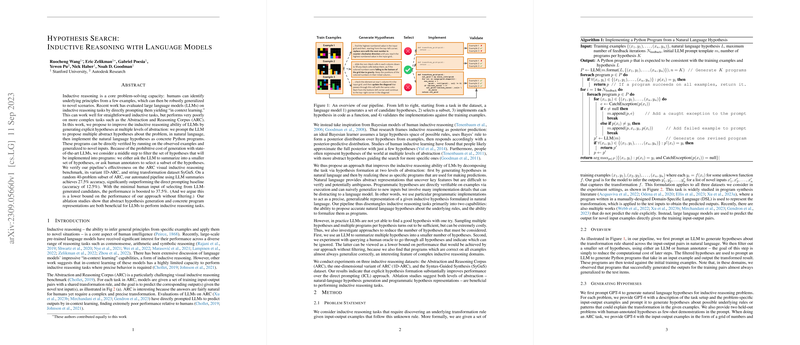An Analysis of "Hypothesis Search: Inductive Reasoning with LLMs"
The paper "Hypothesis Search: Inductive Reasoning with LLMs" presents a novel approach to enhance the inductive reasoning capabilities of LLMs. By generating hypotheses at multiple levels of abstraction, the authors propose a structured methodology for tackling complex inductive reasoning tasks, a prominent challenge within artificial intelligence research.
The core of the proposed methodology is the generation of explicit hypotheses about inductive tasks in natural language, which are then formalized as Python programs. This dual-layer approach is substantiated by empirical results on three diverse datasets: the Abstraction and Reasoning Corpus (ARC), its variant 1D-ARC, and the Syntax-Guided Synthesis (SyGuS) dataset. Notably, on a 40-problem subset of ARC, the pipeline utilizing LLM-generated summaries achieved substantial accuracy improvements (27.5%) over a direct prompting baseline (12.5%), underscoring the efficacy of the proposed strategy.
Methodological Insights
The methodology outlined in the paper involves a series of well-defined steps that reflect a deep understanding of inductive reasoning tasks. The process begins by prompting an LLM, specifically GPT-4, to generate multiple candidate hypotheses in natural language. Subsequently, these hypotheses are filtered either through LLM summarization or human selection, to ensure computational efficiency in the subsequent programming phase. The filtered hypotheses are then translated into Python programs, which are rigorously validated against known examples.
This framework draws inspiration from Bayesian models of human inductive reasoning, adeptly combining the expansive hypothesis space explored by LLMs with program-based precision. The usage of programs allows for explicit verification, providing a solid foundation for generalization to new inputs – a critical aspect of inductive reasoning tasks.
Empirical Evaluation and Results
The authors successfully demonstrate the effectiveness of their approach across various settings. On the 1D-ARC dataset, their full pipeline notably outperformed direct prompting, recording an accuracy of 77.8% against 38.8%. For the SyGuS dataset, leveraging language-model-derived hypotheses yielded close to state-of-the-art results with significantly fewer programmatic explorations.
A significant portion of the paper is dedicated to ablation studies that highlight the contributions of different components of the pipeline. These include executions without hypothesis reduction or utilizing GPT-3.5 instead of GPT-4, providing a comprehensive analysis of variables impacting performance.
Discussion and Implications
The findings of this paper have substantial implications for both theoretical advancements and practical applications in AI. On a theoretical level, it highlights the potential of combining LLMs with program synthesis to create systems capable of complex, nuanced reasoning. Practically, the approach could streamline tasks in fields requiring structured problem-solving strategies, such as automated programming and data transformation tasks.
However, the authors also acknowledge certain limitations and areas for future work. The reliance on proper natural language hypothesis generation and the computational cost involved in program execution underscore the need for ongoing research to refine these aspects. Furthermore, the research raises the question of how such systems might evolve with the advent of more powerful, versatile LLMs and the potential integration of vision-LLMs.
Conclusion
In summary, "Hypothesis Search: Inductive Reasoning with LLMs" offers a persuasive and practical approach for enhancing LLMs' inductive reasoning capabilities. Through rigorous experimentation and thoughtful analysis, the authors provide a clear demonstration of how structured hypothesis generation and verification can significantly elevate performance in complex reasoning tasks. As AI research continues to explore the boundaries of what LLMs can achieve, work like this provides both a foundational methodology and a vision for the potential future directions of multi-modal reasoning systems.
